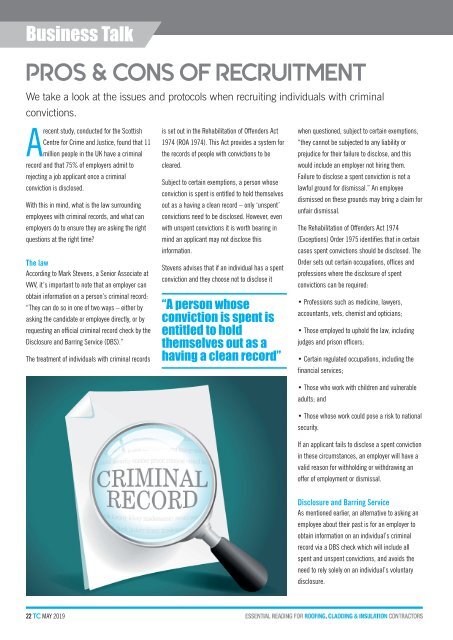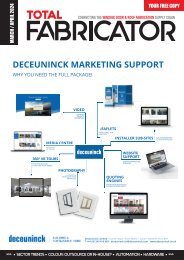May 2019
You also want an ePaper? Increase the reach of your titles
YUMPU automatically turns print PDFs into web optimized ePapers that Google loves.
Business Talk<br />
PROS & CONS OF RECRUITMENT<br />
We take a look at the issues and protocols when recruiting individuals with criminal<br />
convictions.<br />
Arecent study, conducted for the Scottish<br />
Centre for Crime and Justice, found that 11<br />
million people in the UK have a criminal<br />
record and that 75% of employers admit to<br />
rejecting a job applicant once a criminal<br />
conviction is disclosed.<br />
With this in mind, what is the law surrounding<br />
employees with criminal records, and what can<br />
employers do to ensure they are asking the right<br />
questions at the right time?<br />
The law<br />
According to Mark Stevens, a Senior Associate at<br />
VWV, it’s important to note that an employer can<br />
obtain information on a person’s criminal record:<br />
“They can do so in one of two ways – either by<br />
asking the candidate or employee directly, or by<br />
requesting an official criminal record check by the<br />
Disclosure and Barring Service (DBS).”<br />
The treatment of individuals with criminal records<br />
is set out in the Rehabilitation of Offenders Act<br />
1974 (ROA 1974). This Act provides a system for<br />
the records of people with convictions to be<br />
cleared.<br />
Subject to certain exemptions, a person whose<br />
conviction is spent is entitled to hold themselves<br />
out as a having a clean record – only ‘unspent’<br />
convictions need to be disclosed. However, even<br />
with unspent convictions it is worth bearing in<br />
mind an applicant may not disclose this<br />
information.<br />
Stevens advises that if an individual has a spent<br />
conviction and they choose not to disclose it<br />
“A person whose<br />
conviction is spent is<br />
entitled to hold<br />
themselves out as a<br />
having a clean record”<br />
when questioned, subject to certain exemptions,<br />
“they cannot be subjected to any liability or<br />
prejudice for their failure to disclose, and this<br />
would include an employer not hiring them.<br />
Failure to disclose a spent conviction is not a<br />
lawful ground for dismissal.” An employee<br />
dismissed on these grounds may bring a claim for<br />
unfair dismissal.<br />
The Rehabilitation of Offenders Act 1974<br />
(Exceptions) Order 1975 identifies that in certain<br />
cases spent convictions should be disclosed. The<br />
Order sets out certain occupations, offices and<br />
professions where the disclosure of spent<br />
convictions can be required:<br />
• Professions such as medicine, lawyers,<br />
accountants, vets, chemist and opticians;<br />
• Those employed to uphold the law, including<br />
judges and prison officers;<br />
• Certain regulated occupations, including the<br />
financial services;<br />
• Those who work with children and vulnerable<br />
adults; and<br />
• Those whose work could pose a risk to national<br />
security.<br />
If an applicant fails to disclose a spent conviction<br />
in these circumstances, an employer will have a<br />
valid reason for withholding or withdrawing an<br />
offer of employment or dismissal.<br />
Disclosure and Barring Service<br />
As mentioned earlier, an alternative to asking an<br />
employee about their past is for an employer to<br />
obtain information on an individual’s criminal<br />
record via a DBS check which will include all<br />
spent and unspent convictions, and avoids the<br />
need to rely solely on an individual’s voluntary<br />
disclosure.<br />
22 TC MAY <strong>2019</strong>

















